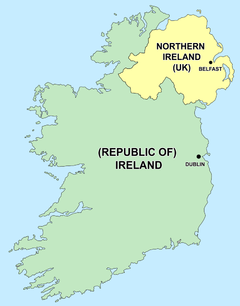United Ireland
(nation state) | |
|---|---|
 Partitioned Island of Ireland | |
United Ireland, also referred to as Irish reunification, is the proposition that all of Ireland should be a single sovereign state. At present, the island is divided politically; the sovereign Republic of Ireland has jurisdiction over the majority of Ireland, while Northern Ireland, which lies entirely within (but does not constitute the entirety of) the Irish province of Ulster, is part of the United Kingdom. Achieving a united Ireland is a central tenet of Irish nationalism and Republicanism, particularly of both mainstream and dissident republican political and paramilitary organisations. Unionists support Northern Ireland remaining part of the United Kingdom, and therefore oppose Irish reunification.[1]
Contents
Background
Ireland has been partitioned since May 1921, when the implementation of the Government of Ireland Act 1920 created the state of Northern Ireland within the United Kingdom. The Anglo-Irish Treaty, which led to the establishment in December 1922 of a dominion called the Irish Free State, recognised partition, but this was opposed by anti-Treaty republicans. When the anti-Treaty Fianna Fáil party came to power in the 1930s, it adopted a new constitution which claimed sovereignty over the entire island. The Irish Republican Army (IRA) had a united Ireland as its goal during the conflict with British security forces and loyalist paramilitaries from the 1960s to the 1990s known as The Troubles. The Good Friday Agreement signed in 1998, which ended the conflict, acknowledged the legitimacy of the desire for a united Ireland, while declaring that it could be achieved only with the consent of a majority of the people of Northern Ireland.[2]
Referendum call
In 2016, Sinn Féin called for a referendum on a united Ireland following the decision by the United Kingdom to leave the European Union (EU). The decision had increased the perceived likelihood of a united Ireland, in order to avoid the possible requirement for a hard border between Northern Ireland and the Republic of Ireland, though the imposition of a hard border did not eventuate. Taoiseach Enda Kenny said that in the event of reunification, Northern Ireland should be allowed to rejoin the EU, just as East Germany was permitted to join the EU's predecessor institutions by reuniting with the rest of Germany after the fall of the Berlin Wall.[3]
Unionists versus Nationalists
In demographic terms, Northern Ireland was created to contain a majority of Ulster Protestants, who almost all favour continued union with Great Britain, and did so for most of its history. Four of the six counties have Irish Catholic majorities and majorities voting for Irish nationalist parties, and Catholics have become the plurality in Northern Ireland as of 2021. The religious denominations of the citizens of Northern Ireland are only a guide to likely political preferences, as there are both Protestants who favour a united Ireland, and Catholics who support the union. Surveys identify a significant number of Catholics who favour the continuation of the union without identifying themselves as Unionists or British.[4]
United Ireland President?
On 16 October 2023, Matt Kennard posted on X:
- "Follow @ChrisHazzardSF. In my opinion, he's the most talented progressive MP in UK parliament—and he's not yet 40.
- "Super articulate - with principles and an international outlook - Chris Hazzard could be the first president of a united Ireland."[5]
References
- ↑ "Irish reunification What is a border poll? And who is calling for one to take place?"
- ↑ "If we’re heading for a hard Brexit, then we’re heading for a united Ireland"
- ↑ "Europe could allow a united Ireland to join EU after Brexit"
- ↑ "United Ireland referendum is inevitable after Brexit, says Irish parliamentary report author"
- ↑ "Chris Hazzard could be the first president of a United Ireland"
Wikipedia is not affiliated with Wikispooks. Original page source here